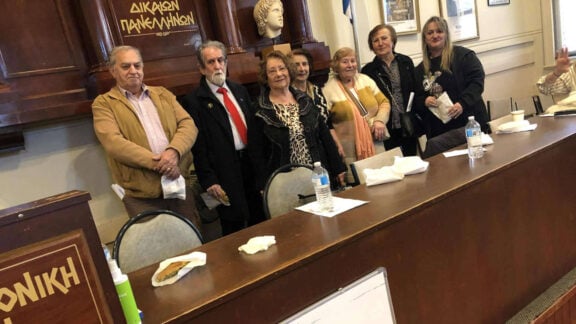The Greek Diaspora, Philhellenism worldwide, the Greek culture from antiquity to the present, as well as classical studies and humanities were at the heart of an event organised by the Hellenic Parliament Foundation for Parliamentarism and Democracy.
The event took place on the evening of Wednesday, July 17, at the café in the garden of the Numismatic Museum.
The occasion was dedicated to the study by Anastasios M. Tamis, titled “The Aegis of Hellas: The Continuing Vigour of Philhellenism,” which was recently released by the Hellenic Parliament Foundation.
The Secretary-General of the Hellenic Parliament Foundation, Professor Evangelos Chatzivasileiou, who coordinated the event, highlighted that the publication provided an opportunity for the foundation to connect with the world of the Greek Diaspora. He described it as a significant step towards reaching out to Hellenism globally and promoting Greek culture across the planet.
During the event, the Australian Ambassador to Greece, Alison Duncan, expressed her delight as it was her first speech in the country, having presented her credentials to the President of the Republic only three days prior. Ambassador Duncan discussed the profound cultural, economic, and social impact of the Greek Diaspora in modern Australia, emphasizing the vitality of the Greek-Australian community and the bonds between the two nations.
George Babiniotis, Honourary Professor of Linguistics and former Rector of the University of Athens, delivered an academic biography of Professor Tamis.
The journey began in the early 1970s when Tamis arrived in Australia at a young age for studies.
Babiniotis elaborated on Tamis’s research path, from journalism to social linguistics and the study of the Greek Diaspora, highlighting the rich scope of his work.
He particularly emphasised Tamis’s involvement with the National Centre for Hellenic Studies and Research (EKEME) at La Trobe University, where Tamis served as the head.

His tireless efforts resulted in thirty monographs, eight collective volumes, numerous scholarly articles, and the establishment of Greek centers and programs in various countries.
Babiniotis praised “The Aegis of Hellas” as a contemporary study of the Greek Diaspora, a genuine national contribution.
Professor Ioakim Michailidis, Professor of Modern and Contemporary History at the Aristotle University of Thessaloniki, shed light on the central question that underpins Anastasios Tamis’s work: What connects Greek culture across time with the rest of the world, how is this relationship reaffirmed over time, and what role does the Diaspora play within this context?
Michailidis discussed two phases of Philhellenism: the traditional, focused on classical education, and the modern, developed after World War II, specifically referring to modern Greece.
In this second phase, he stressed the decisive contribution of the Greek Diaspora.
Michailidis concluded that “The Aegis of Hellas,” besides its thorough research and breadth, offers food for thought on broader issues such as Western civilisation and classical values in contemporary society.
Evangelos Chatzivasileiou mentioned that through Professor Tamis, we simultaneously honour the Hellenism of Australia, an esteemed part of our Diaspora.
He stressed that Tamis’s work opens intellectual horizons for the international community of Greek letters, welcoming all those “Greeks by choice.”
Despite the decline of humanities studies in recent years, not qualitatively but in terms of their influence, “The Aegis of Hellas” sends an optimistic message, as its title suggests: under Greece’s protection, Philhellenism continues robustly.
Among the audience, distinguished figures included the Honorary Consul-General of Greece in Darwin, Australia, and former Governor of the state, Ioannis A. Anagnostou; Professor of the New York University (NYU) Gas Hadjidemetriou; representative of the Federation of Arcadians in Australia, George Pollalis; Sydney journalist Dimitris Kametopoulos; Member of Parliament for Drama, Theofilos Xanthopoulos; former Rector of the Panteion University of Social and Political Sciences, Georgios Kontogiorgis; Honorary Professor at the Aristotle University of Thessaloniki, Ioannis Mourelos; Director-General of the Research and Study Foundation “Eleftherios K. Venizelos,” Nikos Papadakis; Deputy Head of the General Directorate of Electronic Administration, Library, and Publications of the Library of the Hellenic Parliament, Maria Kamilakidou; and the supervisor of Argyrokastron-Tositseia Schools, Vasiliki Papapetrou-Moursela.







